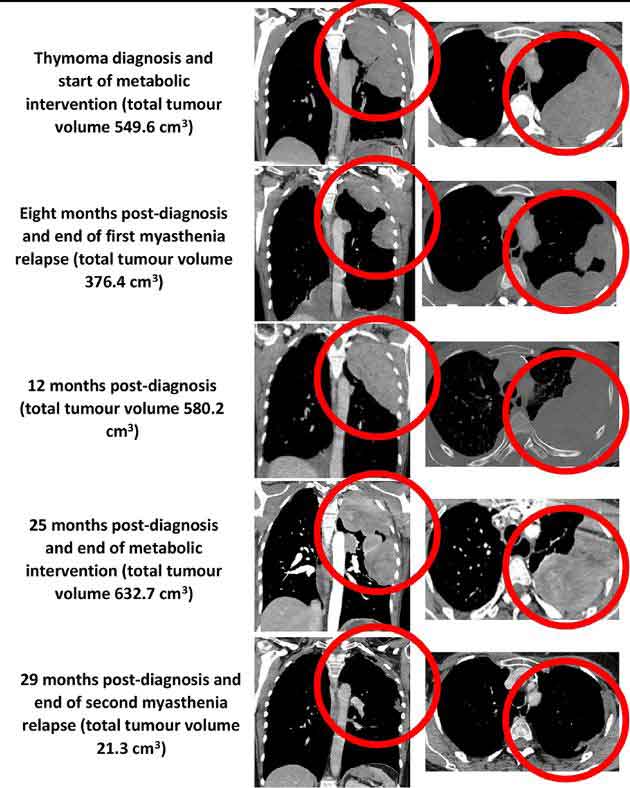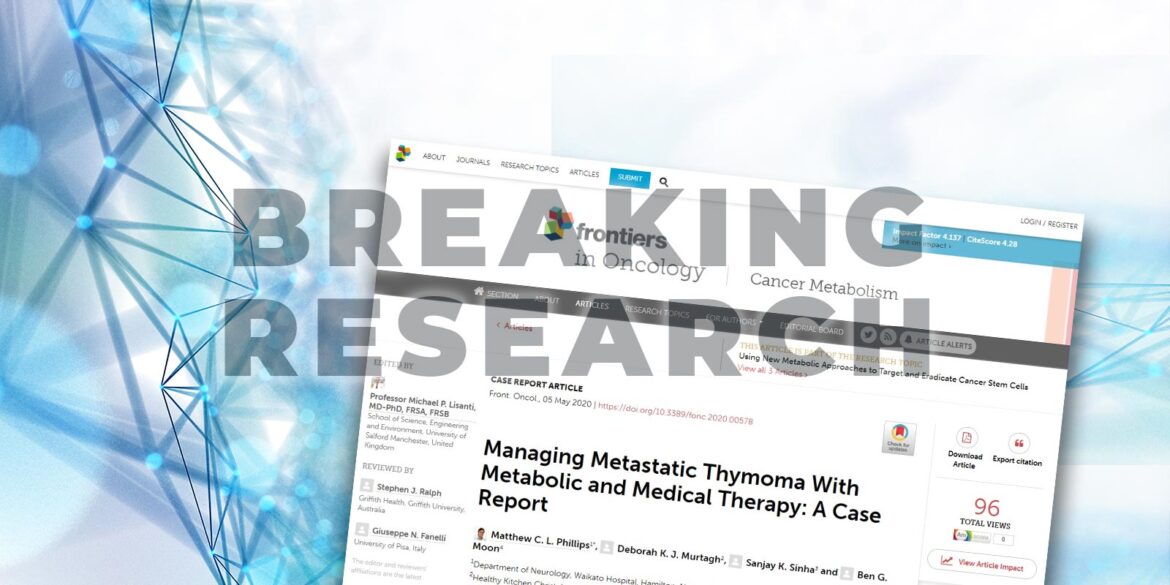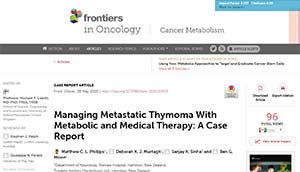Brad and I were fortunate to meet Dr. Mathew Phillips, the first author for this case, at the 2020 Metabolic Health Conference. The paper was in peer-review at the time and we’ve been waiting anxiously for it to be published ever since.
Click here for the original study, Managing Metastatic Thymoma With Metabolic and Medical Therapy: A Case Report, published in Frontiers in Oncology. A summary is below.
The Diagnosis
Our hero, the patient, was diagnosed at 37 with inoperable type AB, stage IVA thymoma, a tumor of the thymus. This kind of cancer is usually associated with a neuro-muscular disease called myasthenia gravis (MG) which can affect the ability to move the eyes, swallow, walk and talk. She’s had MG for over a decade and treated it with various drugs but only discovered the thymus cancer after it had spread to multiple places in her lung and pleura.
The prognosis for inoperable stage 4 thymona is not good. The only conventional treatment available is chemotherapy to perhaps extend her life and ease symptoms. She was 37-weeks pregnant at the time.
She declined chemotherapy and instead chose metabolic intervention only. She delivered a healthy baby girl two weeks later.
The Metabolic Treatment
- Periodic fasting “starting with a 12-day, water-only fast followed by a series of 7-day, fluid-only fasts every 1–2 months.”
- Modified ketogenic diet consisting of 60% fat, 30% protein, 5% fiber, and 5% net carbohydrate by weight on feeding days composed “largely of green vegetables, meats, eggs, nuts, seeds, creams, and natural oils.”
- GKI (ratio of blood sugar and blood BHB ketones) monitoring three times per week.
Her MG was monitored by her neurologist and she took some different medications for that: pyridostigmine, prednisone, and intravenous immunoglobulin (IVIg).
The Results
- Months 1-3 “were uneventful”
- Months 4-7 she struggled to eat and had an attack of MG combined with several weeks of diarrhea. She was treated for the MG but lost 6 kg.
- Month 8 CT scan showed 32% reduction in the tumor. Her MG medication was increased.
- Months 9-12 diarrhea resolved and she regained the weight.
- Month 12 CT scan showed the thymoma had regrown to its original size. The MG medication was reduced.
- Months 13-24 she maintained her weight and was diarrhea-free. Her MG meds were reduced again.
- Month 25 CT scan showed minimal growth of the primary tumor but resolution of some of the metastasis.
- Months 25-29 she had another severe MG attack along with diarrhea and inability to eat. She lost 15 kg and her MG meds were adjusted.
- Month 29 CT scan showed near-complete regression – a 96% reduction in tumor volume!

It took some time for this article to be written, go through peer review and be published but I know from email with the author that “She remains healthy and no evidence of cancer at 3 years.“
The Numbers
Weight:
- During each 1-week, fluid-only fast, she typically lost 2.9 kg (5% of body weight),
- During the first MG attack she lost 6 kg (11% of body weight)
- During the second MG attack she lost 15 kg (28% of body weight).
GKI:
- Her average GKI during fasts was 0.62
- Her average GKI over the entire 2 year period (fasts + keto) was 1.42
Side Effects
“There were several fasting-related adverse effects including cold intolerance, fatigue, and generalized muscle aches, all of which peaked during the first 3 days of each fasting period and progressively resolved over the first year such that they no longer occurred by the second year. No adverse effects occurred in relation to the ketogenic diet.”
Important Take-Aways
“For 2 years, our patient relied almost completely upon a metabolic strategy to manage her metastatic cancer, during which time she remained active, maintained her diagnosis body weight, and the tumor volume increased by a modest 13%”
Through fasting and ketogenic diet she limited the tumor from growing but it was only after the two MG attacks that she saw a major reduction in tumor size.
From the study: “Given that both relapses in our patient were characterized by abnormal immune function and marked weight loss, it is possible that immune activation and extreme energy restriction contributed to the regressions, and since both relapses were treated medically, one or more of the myasthenia medications may have contributed to the regressions.”
The “extreme energy restriction may have contributed to both regressions … During each relapse, our patient experienced a profound reduction in appetite resulting in minimal calorie intake over several weeks. The ensuing weight loss was considerable … In both cases, such a degree of weight loss would have created drastic alterations in ketone, glucose, glutamine, and growth factor levels, fostering a hostile physiological environment for metabolically inflexible cancer cells. Thus, it is possible that an extreme metabolic-induced regression occurred in our patient.
Conclusion
The researchers “hypothesize that 2 years of a combined fasting and ketogenic diet intervention metabolically weakened [the tumor], ‘setting the stage’ for immune activation and extreme energy restriction to destroy the majority of cancer cells during the [MG attacks]” with her MG meds potentially helping to destroy remaining cancer cells.
This is such a perfect example of Dr. Thomas Seyfried’s Press-Pulse therapy. The press of fasting and keto weaken the cancer with other metabolic interventions providing a “pulse.”
I hope it’s not long before these metabolic therapies like fasting and keto become standard of care.
Final Note
I’m so grateful that there are doctors and scientists like Dr. Matthew Phillips and the other authors of this paper who take the time and effort to document the amazing results. There are so many anecdotal reports of metabolic interventions working but, until enough research is published to convince the conventional medical system as a whole, these reports will continue to only come from patients who defy the standard doctor’s orders.
Dr. Phillips has been amazing in answering my questions these past few months. He is a true compassionate healer and passionate scientist seeking the heart of truth.




7 comments
Hi Maggie.I’ve just discovered your website today and really love the content -this person’s account is inspiring to say the least. I’m about to have my OMAD meal and I’ve been in ketosis since getting up this morning – currently about 1.5 GKI . I test with the KetoMOjo and did a bit of experimenting today – found out that the tiny splash of milk in my coffee really stuffs up my ketones! Black coffee it is! Take care.
Hi Cliff! I’m so happy to meet you! I’m so impressed by your dedication. Our experience sounds similar – there are totally random things that will throw me out of ketosis – like milk. Just hearing that you’re sensitive to this and making adjustments based on your personal experience is thrilling to me. Looking forward to hearing more!
Is it always necessary, in your opinion, Maggie, to fast when starting out? I didn’t and went right into therapeutic keto and quickly achieved great numbers. I am a fan of fasting, just want to know if it is a must-do. Thank you.
Hi Dave! I never would have believed it except that I’ve had several clients who, like you, quickly slip into *deep* ketosis and, in fact, need to be careful not to go too deep for doo long. I’m super jealous =D Obviously, it’s not necessary for you to fast to get the benefits of keto for cancer. Even so, in my conversations and email correspondence with Dr. Phillips, he’s pointed out that there are additional benefits from fasting such as autophagy.
While there’s sadly little research, I personally think there’s still value in a periodic 3-5 day fast – especially for those undergoing chemo or radiation (per Valter Longo’s researcher). Above all, listen to your own body, though!
Hi Maggie,
Thank you for sharing so much valuable information. I have a question if it’s OK.
I’ve been dealing with breast cancer since 2011. At this moment it has metastasized (probably since 2018). I’ve always refused chemo, but since the last 2 years I have gradually started the chemo route, first pills and I’ve just finished 3 months chemo infusions (paclitaxel).
I was a bit anxious to try water fasting 3 days with chemo. I really want to incorporate water fasting into the next chemo sessions.
The thing is that the chemo is 3 weeks on one week off. I do try to stay active and exercise but the chemo has made me tired and weak.
I’ve started this week with the therapeutic keto diet.
Im not in deep ketosis at all, but I might start the next chemo session next week.
Should I wait until I reach deep ketosis before is start fasting around chemo, would it make it easier? I terms of not feeling weak and dizzy etc?
Also, could I fast every week 3 days around chemo for 3 weeks in a row? It seems a lot…
I am 1.75 cm and gained weight (82 kg).
I hope you can help,
Thank again,
Raya
Hi Raya! Thank you so much for the kind words. I’m so sorry for what you’ve been going through the last decade.
First, I am, of course, SO not a doctor and consult with your medical team and all that. I can only share the publish research and my personal experience. Personally, fasting has become the most important healing tool I have. I can’t emphasize enough how grateful I am for its benefits – not even the biggest being how much more effective fasting has been shown to make chemotherapy and how much my practice has prolonged the efficacy of my TKI.
Being is deep ketosis will make a fast easier but starting a fast will get you into deep ketosis in 1-2 days (longer if you’re on high-dose steroids). In my non-medical opinion, fasting for 3 days a week for three consecutive days is not a problem at all. For prevention now I fast the first 6 days of every month plus the first day of each week but have done many months of fasting 2-3 days a week.
Amazing! I’m also 175cm and just checked my old cancer journal – I was also 82kg when I was diagnosed. At my lowest with my fasting and way of eating I got to around 60kg. I’m now leveled out at around 65-68kg these days. I’m so grateful to have a little extra weight to support extended fasts now and then.
Sending my love and thoughts of healing!
Thank you Maggie! Lots of love and healing right back atcha!